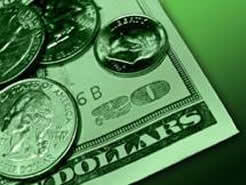Majority Say Investing in the Market Still A Good Idea
Despite Wall Street’s highly publicized problems, a majority of U.S. voters (54%) still think it is a good idea for most Americans to invest in stocks, bonds and mutual funds.

Despite Wall Street’s highly publicized problems, a majority of U.S. voters (54%) still think it is a good idea for most Americans to invest in stocks, bonds and mutual funds.

A majority of U.S. voters (52%) say the federal government needs to do more to deal with the current economic crisis, and 63% think the best stimulus would be more tax cuts. Just 20% think new government spending is what is needed, while 17% aren’t sure which is better.

The Rasmussen Employment Index, a monthly measure of U.S. worker confidence in the employment market, fell sixteen points in October to 72.1. That’s the biggest single month drop and the lowest level of confidence ever recorded in the five-year history of the Index.

Eighty-seven percent (87%) of U.S. voters say elections are important to the overall health of the stock market, but voters are evenly divided on the impact of either John McCain or Barack Obama winning on Tuesday.

Oil prices are plummeting, and the Organization of Petroleum Exporting Countries (OPEC), including Saudi Arabia and Venezuela, doesn’t like it. For Americans, it means the lowest prices they’ve paid at the gas pump in months.

Nearly half (47%) of U.S. voters say Congress has more control over the direction of the economy than the president and the chairman of the Federal Reserve Board.

The Discover (R) Small Business Watch (SM) dropped for the second straight month as news of a congressional rescue plan failed to lift the spirits or expectations of the nation's 22 million small business owners.

Fifty-eight percent (58%) of U.S. voters say more tax cuts will better stimulate the economy than new government spending, even as Congress considers a second stimulus plan that could cost as much as $300 billion.

The mounting economic crisis is eroding Americans' optimism in their financial security. The COUNTRY Financial Security Index(SM) slid 1.1 points to 68.8 in October, fueled by dramatic declines among men, pre-retirees and high income individuals.

Forty-one percent (41%) of Americans think the federal government should provide tax incentives for anyone who buys a car from a U.S. auto company, as two of the Big Three automakers talk merger to survive in the current economic climate.

Sixty-two percent (62%) of Americans expect stock market values to be higher in five years than they are today, even after a month of highly-publicized troubles on Wall Street.

A plurality of voters (47%) say Barack Obama’s plan to raise taxes on those who earn over $250,000 a year is good for the troubled U.S. economy, even though 51% still believe that lower taxes are the best way to spur economic growth.

A majority of voters (52%) favor John McCain’s plan for the federal government to buy up distressed mortgages and refinance them so homeowners can stay in their homes, according to a new Rasmussen Reports national telephone survey. Thirty-five percent (35%) oppose the plan.

The Discover U.S. Spending Monitor dipped 2.2 points to 86.5 in September, as consumers grew increasingly concerned about the U.S. economy and worked hard to hold-the-line on future spending plans.

Sixty-three percent (63%) of U.S. voters say Wall Street will benefit more than the average taxpayer from the revised $700-billion economic rescue plan the House is expected to vote on today. Just 22% think the taxpayer will benefit more.

The Rasmussen Employment Index, a monthly measure of U.S. worker confidence in the employment market, gained six points in September to 88.1.

Just as many American adults think an across-the-board tax cut would help the economy as the number who favor Congress passing a financial rescue plan, according to a new Rasmussen Reports national telephone survey.

Just 26% of American adults have even a little bit of confidence that the nation’s policy makers know what they’re doing when it comes to the current problems on Wall Street.

Voters are evenly divided over whether Congress should take action to help the troubled financial industry or just let Wall Street work out its problems on its own, according to a new Rasmussen Reports national telephone survey.

Economic confidence among small business owners declined sharply in September amid rising concerns about economic conditions for their businesses and a bleak vision of where the economy is headed. The Discover(R) Small Business WatchSM fell to 74.6 in September, down 12.3 points from August.